#ramadan presents
Explore tagged Tumblr posts
Text
Ramadan iftar dubai 2025, Iftar experiences in Dubai
Ramadan iftar dubai 2025, Iftar experiences in Dubai, Ramadan 2025 Start Date, ramadan uae timings, ramadan schedule uae, ramadan uae working hours, dubai paid parking timings ramadan, ramadan presents, ramadan gift ideas, eid gifts for her, amazon ramadan sale https://socialkandurablogs.wordpress.com/2025/02/28/best-ramadan-iftar-experiences-in-dubai-2025/ https://socialkandurablogs.wordpress.com/2025/02/28/ramadan-2025-start-date-announced-heres-what-to-expect/ https://socialkandurablogs.wordpress.com/2025/02/28/uae-announces-adjusted-working-hours-for-ramadan-2025/ https://socialkandurablogs.wordpress.com/2025/02/28/dubai-rta-announces-ramadan-2025-public-transport-and-parking-timings/ https://socialkandurablogs.wordpress.com/2025/02/28/ramadan-eid-gifts-ideas-for-every-budget/ https://socialkandurablogs.wordpress.com/2025/02/28/amazon-ae-ramadan-sale-last-chance-to-grab-the-best-deals/
#Ramadan iftar dubai 2025#Iftar experiences in Dubai#Ramadan 2025 Start Date#ramadan uae timings#ramadan schedule uae#ramadan uae working hours#dubai paid parking timings ramadan#ramadan presents#ramadan gift ideas#eid gifts for her#amazon ramadan sale
0 notes
Text
decided i need to budget better but first i must see where all my money goes so this month im going crazyyyyyy and next month the budgeting begins 😔
#ameera speaks#worst month to track actaully bc theres 2 upcoming birthdays i need to get presents for and going out#grrrrrrrrr#actually maybe i shoukd wait to start budgeting then....#bc theres 2 birthdays. (presents and going out) ramadan (im not buying food like i normally do) eid (more cash incoming) and in may im#changing my hours to more per week so whats the point in tracking in march - april if april - may is gonna be a different incoming..#BUT my biurthdays in may so thr expenses are different !!!!!!#worst months to track and budget: november. december. january (i work christmas. black friday. boxing day and new years. income is different#march - april (ramadan and eid)#may (my birthday)#but waiting till June to start bidgeting is stupid
4 notes
·
View notes
Text
Does it Work?
A little over a year ago I wrote about my new watch (read here). In a nutshell, the watch doesn't have any mechanism to tell the time - it only says, "NOW". My purpose for getting and wearing the watch was to act as a constant reminder to be present in the moment, to be aware and focused on what I am doing and who I am with. My plan was to have a proverbial string on my finger, with a very specific reminder of mindfulness.

At first my reminder worked really well, and I even noted gave the added benefit of helping me let go of small worries and focus on what was more important (like enjoying time with my family rather than stressing over work which needed to be done). It's been a while and I think it is useful to look back and assess from time to time.
So does my watch continue to help me be present and aware, mindful and happy? Well, yes and no. As with any reminder, the more comfortable and accustomed to something we are - the less we notice it. When we first put on a ring or watch, it can be irritating, the weight or size can feel odd... but if we continue to wear it for months or years, then it feels funny when we take the ring or watch off. So that's what I do. I wear my watch a few days, I take it off for a few days, I switch the wrist it is on.

I actually have a program on my laptop which locks my screen after a set amount of time and tells me to stand up and walk around. (Check out Workrave if you want such an annoying and very helpful program!) This reminder is harder to get used to, but there are always workarounds. I can close the program if I know I don't want to be interrupted. I can also use keyboard shortcuts to open up task manager and stop the program after it locks my screen.... the point is: with either reminder, they only work as much as I allow them to.

It is easy to make intentions and set reminders. It is also fairly easy to ignore those reminders and go against our intentions. Some people set an alarm knowing that they will hit the "snooze" button multiple times. Others are able to get right up without delay. Neither is correct or wrong, I think the point is to be self aware enough to know what is useful for us and how best to engage with it. I know that my reminders work most of the time, even though I can still ignore them.
I can think of a host of ways people already have reminders for personal improvement, with varying levels of success: fitness trackers (health), going to church (spirituality), setting alarms, AA meetings, mentorships, reading books, meditation or prayer, accountability partners, regular gym times... right now is both the season of Lent and the month of Ramadan - both times of the year set aside as reminders for spiritual growth and personal betterment.

What helps you be your best self? What is an area of growth for you and who or what reminds you to work on that area of growth? Do you have annoying or helpful reminders which help? What are some ideas - for yourself or others - of ways to gently remind?
#workrave#mindfulness#time#break#reminder#commitment#present#social media#snooze#alarm#self awareness#health#Lent#Ramadan#prayer
1 note
·
View note
Text
Ramadan Lecture 2025 Award Presentation & Special Prayer By T F K ENUJADOLLAR
Ramadan Lecture 2025 Award Presentation & Special Prayer By T F K ENUJADOLLAR Ramadan is the most blessed month during which Muslims are Divinely facilitated to draw nearer to Allah the Exalted. In this last Jumu’a before Ramadan, Shaykh Yahya Rhodus focuses on how to prepare for Ramadan, including discussing the greatest means of preparation. He also provides a list of Sunnahs related to…
0 notes
Text
T-shirts, hats, & more merch w/ my #LEGO block maze design are 30% off through Friday. Start your Christmas, Hanukkah, Ramadan, Diwali, Solstice, or completely secular shopping now!
Of course, ALL my other #maze designs & more are too, so look around.
"Brick Block Maze" Classic T-Shirt for Sale by AiXeLsyD13 | Redbubble
#maze#LEGO#brick#block#Christmas#Hanukkah#Diwali#Ramadan#Solstice#Holiday#Secular#present#gift#shopping#holiday shopping#art#T-shirt#sale#RedBubble
1 note
·
View note
Text
“My name is Nour Saqer, for the name remains when all is lost. I turned 22 years old last November. Yes. My youthful time was wasted on horrible days. Yes. Those days still continue.
My name is Nour Saqer. And I am 22 years old. I am a fifth-year dental student at Al-Azhar University of Gaza. I am an aspiring student. I am eager and passionate about my studies. Until the last minute, I was allowed to stay at my house on Oct. 7th. 2023 I was still working on a scientific research proposal that was supposed to be published by me and my teammates of young researchers late in November, that year.
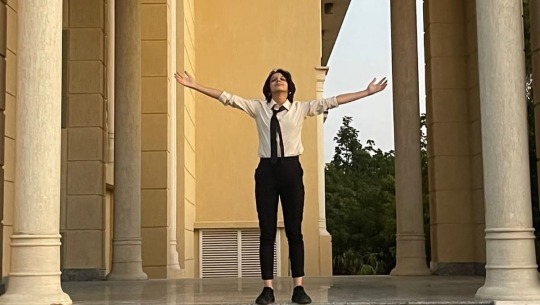
This picture of me was taken late 2022 during an international dental conference held in campus.
During my college years alone. Me and my family have had to forcefully evacuate, and run out of our house four times. In 2019, 2021, 2022, and finally in 2023. Each time was in fear of the same threat; meeting our deaths under rubble. My name is Nour Saqer. And I have always been a Gazan. Each of those past times. If we were fortunate enough, we would discover that our home was in repairable damage. There would be a roof over our heads still. We were still fortunate. We still had luck.
But ever since October 7th. I haven't returned home. We were among the first families to evacuate Al-Rimal neighborhood from the very first day of this genocide, we had to turn our backs to it and expect no return. Two floors of my family house, along with my father's store, and only source of income, have been severely destructed due to neighboring missiles. And my university buildings were heavily exploded. All forms of life have been reaped from my city. My hometown.
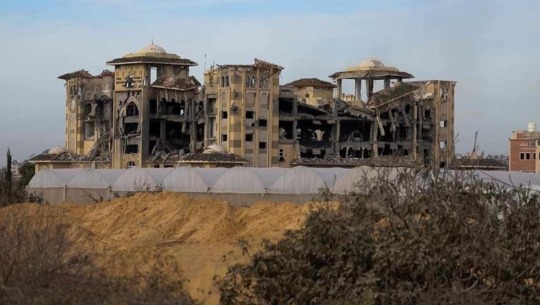
This is what's left of our campus. I was supposed to have my graduation ceremony here.
My name is Nour Saqer. And I had an enthusiastic heart. And an energetic body. I played sports and walked down every street until I couldn't. I loved my family and friends dearly. I wrote poems about them. I spent time loving them and cherishing their presence. I loved life with all its little things. With all its unattainable things. I loved the grass and the tall buildings. And I loved all people. I loved my people. All their faces. All their talents. All their hidden lives. All we shared. Until we didn't. Everything I have ever loved I lost.
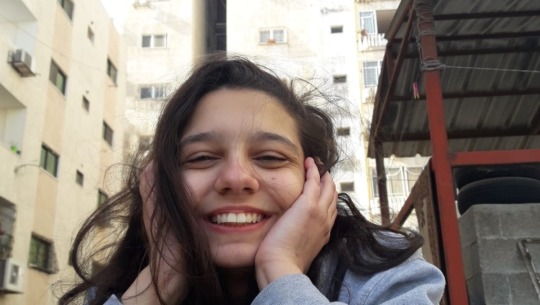
This picture of me was taken during a happy moment on the roof of our house.
This is all that is left of that picture now.
I am currently sheltered in Rafah with my family of 7. Sharing a place with 30 other homeless people. By the end of Ramadan, me and my family would have to evacuate and seek shelter for yet the 8th time due to housing problems. I am so tired of not having any sense of stability. Nothing to guarantee. Nothing to call my own. Every passing minute the situation in Rafah gets worse. Every passing minute I am losing loved ones and relatives. Every passing minute costs me my sanity. Costs me health. Costs me my basic rights to simply live.
I have nothing left to lose or pay the price with except for my life.
I don’t know how to retell my life story in limited words, how to make the most ordinary moments sound precious. How do I equate my value to someone deserving a life of safety? How do I shape myself as someone worth saving?
I have been interviewing myself for days. All my stories are choking me. All my grief is piling up and muting me. I keep trying to find a way to present the best of myself. To make myself someone you'd want to look at. Listen to. And even more,
Help.
I am finally placing both hope and faith in your helpful hands. I am asking you. Please put an end to this continuing tragedy. And help me get to safety. Before it's too late.
It should be in your knowledge that:
It costs $5,000 per person to get out of Rafah through the Boarder Crossing to Egypt. The rest of the donations will be to secure my tution money for the fifth and final year of dental school.
Thank you.”
#kindly read this !!#please help nour in any way you can#if you can’t donate then at least ask your friends & family to share & donate#it will count as something#palestine#gaza#free palestine#from the river to the sea palestine will be free#🇵🇸#ethnic cleansing#genocide
1K notes
·
View notes
Text
The guy who does the lab pickups at my job is an afroarab Muslim guy and he'd been the lab guy for A While prior to me starting and I was in conversation with a coworker when we both realized that we did not know his name. I at least had the excuse of being new, but it shocked her to know that she'd seen this man's face every day and not once had ever thought to ask his name.
So the next time he came in I asked, and he smiled and told me. It was a very Arabic name, and he speaks with a pretty heavy Arabic accent.
Christmas season that year came and went and I asked him if he celebrated. He sort of dodged the question, so the next time I saw him I asked what holidays he did celebrate. He became extremely bashful before mumbling that he just celebrated two. I asked, is it Eid? And he suddenly perked up and smiled said yes, and he observes Ramadan too.
I think, genuinely, that he expected to be punished for reminding me that as an Arab man he was significantly more likely to be Muslim than Christian. I am sure he has heard all sorts of nasty things and experienced all sorts of terrible discrimination. But he was happy when I recognized the signaling, and happy that I wanted to offer my respect to him.
This year, Ramadan is fast approaching, and so is my surgery date. I will be gone for most of Ramadan since it begins two days before my surgery and the day after my leave begins, so I warned him that I wouldn't be there to wish him well during, and I might not be present for Eid depending how long the surgery recovery goes before I can come back to work.
When I tell you this man was visibly worried. I told him I might be able to be back for Eid, and he said "I hope I will see you then."
When I asked him his name, he told me very few people ever bother. I began to make it a point to greet him by name every single day I see him.
And he always greets me back and calls me his friend.
There's no moral to this story. I just. I think this is how I want to live my life. By making it plain that I am standing in solidarity and peace with those even when they are quite different from me.
1K notes
·
View notes
Text
"The moon"
ok ya'll! I know I said I'm doing another chapter of this is me trying (and I am) buttttt I read @i-cant-sing's time traveler AU and I could not stop thinking about it. I'm muslim and it's Ramadan and I realized I have free will to write whatever I want, SO i present to you a platonic yandere story set in the Ottoman Empire. kinda based on real people and events, but a lot of things are just my imagination! I am NOT a history buff, I just enjoy historical things, if something is wrong, feel free to politely correct me. The main character is a female and does have a name (Esmira) and face type BUT i try not to go into her too much so you can imagine what you like. Credits to @i-cant-sing, it was their writing that inspired me! check out their works, they're really talented! I DO NOT SPEAK TURKISH, ALL MY KNOWLEDGE IS GOOGLED AND SURFACE LEVEL.
Ottoman Empire, Istanbul
Year 1524
I was my father’s moon.
"Benim ayım."
He called me that when I nestled against his side, his arms encircling me as he listened to my childish recitation of the Qur’an, my voice small yet steady. “My little moon,” he would murmur, pressing a kiss to my forehead when I finished. “No one recites as beautifully as my Esmira.”
To me, he was not Sultan Suleiman the Magnificent. The Lawgiver, the formidable warlord. To me, he was my beloved Baba.
I would giggle, curling my fingers into the folds of his kaftan. I never sat apart from him, never kept a polite distance. When we dined, I ate off his plate, tearing bread from his own hands, dipping it into his soup the way I had since I was old enough to chew.
"You will spoil her, Hünkârım," my mother, Medriveh, would say from across the room, watching as my father lifted me onto his lap, letting me pick the ripest dates from his tray.
"She is already spoiled," he would reply, laughter deep in his chest. And he would not send me away. He never sent me away.
I prayed with him, every dawn and every dusk, my small voice whispering after his as we kneeled on the prayer rugs. When my hands trembled in the cold, he would clasp them in his own, warming them against his palms.
"When you are older, you will have a place beside me," he had told me once, his thumb tracing circles over my knuckles. "Even when I go to war, my moon will stay in my sky."
I believed him.
When he rode through the palace gates on his great black stallion, I was the only one out of my siblings- Mustafa, Selmin, Mehmed, and Layla- he lifted onto the saddle before him. I would press my cheek to his chest, feeling his laughter rumble beneath my ear as he held the reins in one hand, keeping me close with the other.
I thought it would always be like that. I thought nothing could take me from him.
I was wrong.
My mother never hit me.
She did not need to.
Her weapons were sharper than any blade, her words precise and cruel, cutting deep where no one could see.
"You embarrass me, Esmira," she would sigh, pinching the bridge of her nose whenever I stumbled in my lessons or tripped over my skirts. "Must you always follow your brothers like a stray dog? They have no use for you."
"I just want to be with them."
"They do not want to be with you."
Her disappointment weighed heavier than any slap.
I had always adored Mustafa, Selmin, and Mehmed. I ran after them in the gardens, trailed them through the halls, sat at their feet as they practiced swordplay.
I wanted to be part of their world, to belong with them as I had once belonged with my father.
But they were always too fast, too sharp, too indifferent.
"Go away, Esmira." Selmin’s voice was rough, barely sparing me a glance as he wiped sweat from his brow, his sword resting against his shoulder. "We are not playing games."
"I can learn too!"
"You are not a soldier." Mustafa did not even look at me, already turning back to his sparring partner. "You are not even useful."
Mehmed was the only one who pretended to care, giving me his easy, careless smile.
"Little sister, you should be with the women," he said, flicking my forehead with two fingers. "We are busy."
"I just want to be near you."
"Then sit quietly. Do not make a fuss."
So I did. I sat in the dirt, in the sun, in the cold. I waited for them to acknowledge me.
They never did.
Layla was everything I was not. Four years older than me, and stunning. The true daughter of a Sultan
She was graceful where I was clumsy, beautiful where I was plain, loved where I was ignored.
"Your sister was never like this," my mother would say as she brushed my hair, her touch firm and impersonal. "She knew how to behave, how to walk, how to be wanted."
Layla was desired by all who saw her. Even the women in the harem whispered about her, about her elegance, her cruelty, her charm.
"You are fat, Esmira," she told me one afternoon, watching as I struggled to fit into the new silk kaftan our mother had gifted me. "And slow. And foolish."
"You are my sister," I whispered. "You should love me."
She only smiled.
"Love is earned, little one. And you have done nothing to earn it."
Then, one day, a week after my tenth birthday everything changed. I was going to my father, to try and capture his attention again when I heard her. My mother.
"She is useless, Hünkârım. If you will not marry her off, then send her away."
I pressed my back against the lattice screen, breath trapped in my chest. I was too young to marry. Baba always said he would wait till I was eighteen. That he would keep me forever if I wanted.
"To where?" He replied sharply.
"To the Greeks," my mother said smoothly, as if my fate was nothing more than a chess piece being moved across the board. "The Basileus of Morea wishes for an Ottoman princess as a ward. A peace offering."
"She is only a child, Mehdrivan."
"She is a disgrace."
Silence. A silence so deep it felt like the air itself had stopped moving.
Then, finally, the words that destroyed me.
"Fine."
The world blurred around me. My heart slammed against my ribs, a desperate, caged thing trying to claw its way out. I waited till my mother had left, till i could no longer hear her cruelty.
No. No, no, no.
I did not think. I ran.
I burst into my father’s chamber, barefoot, breathless, trembling.
He stood near the window, his hands clasped behind his back, gazing down at the courtyard below. The glow of the setting sun burned against his silhouette, making him seem even larger, more untouchable.
I was eight again, running to him after falling in the gardens, scraped knees and teary eyes, knowing he would pick me up, soothe me, call me his moon.
But I was not eight. And he did not turn.
"Baba!" I cried, voice breaking.
Slowly, he turned to me.
For a moment, just a moment, his face softened. But it was gone in an instant, replaced by the unreadable mask of a ruler, not a father.
"Esmira," he said, his voice even, measured. Distant.
I did not hesitate—I threw myself at his feet.
"Baba, please!" I clutched at the hem of his kaftan, my nails digging into the silk as if I could physically hold myself to him. "I will be good—I will do better! I don’t want to go! I don’t know their language, their God—they will kill me! Let me stay! I love you, Baba! I will stay by your side forever!"
His hands curled into fists at his sides.
"Stand up, Esmira."
"No!" I sobbed into the fabric of his robes, shaking my head, pressing my forehead to his knee like a beggar at the steps of a mosque. "Please, please, please, I will do anything! I will stop following my brothers, I will stop embarrassing you, I will be what you want, just don’t send me away!"
Nothing.
Not a touch. Not a word.
I felt his silence like a blade slicing through me.
"I do not care about peace!" I cried, hands fisting against him. "I only care about you!"
Finally, finally, he spoke.
"You must go, Esmira. It is for the good of the empire."
Something deep inside me cracked—so violently I swore I heard it echo in the vast, empty space of the chamber.
I recoiled from him, stumbling back.
"You are my father!" My breath came in ragged, uneven gasps. "I am your daughter! I am not a pawn for your empire!"
He did not move. He did not reach for me.
"You are a princess of the Ottoman Empire." His voice was hard, cold. A warlord’s voice, not a father’s. "You will do your duty."
I shook my head, tears burning like acid down my cheeks.
"If you send me away, I will never love you again."
Something flickered in his eyes.
"Esmira—"
"I swear to God, Baba!" My voice rose in fury, in anguish, in something too deep to name. "I swear by Allah Himself, if you listen to my mother, if you send me away, I will never forgive you! Never! You will not be my father anymore!"
His nostrils flared. His lips pressed into a thin line.
"You will not speak to me that way."
"You are not listening to me!"
I was screaming now, screaming as if the force of my voice alone could bring him back to me.
"I will hate you for the rest of my life!"
And then—he struck me.
The first slap sent me reeling. The second tore the breath from my lungs.
My ears rang. My vision blurred.
I staggered back, stunned, unable to process what had just happened.
He had never hit me before.
Never.
Not once in my entire life.
His sons had felt his hand before—when they disobeyed, when they failed, when they acted recklessly. But not me.
Never me.
I stared up at him, at the man who had once held me in his arms, who had once called me his moon.
I did not recognize him.
He was no longer my Baba—he was Sultan Suleiman, the Great Turk, the Shadow of God on Earth, the warlord who crushed enemies beneath his heel and ruled an empire with an iron fist.
And now, I was afraid of him.
His expression shifted. Regret flickered in his gaze. His hands trembled as he reached for me.
"Esmira—"
I flinched.
I flinched away from him.
For the first time in my life, I feared my own father.
The moment stretched between us, heavy, suffocating.
I saw the realization dawn on him—saw the way his chest rose sharply, saw the way his hands fell to his sides, saw the guilt carve into his face like stone.
But I did not give him the chance to take it back.
I turned and ran.
I did not stop running.
Not when I reached the halls. Not when the guards called after me. Not when my mother’s voice echoed in the distance.
I ran until my lungs burned, until the cold air cut through my thin silk dress, until the world blurred into nothing but streaks of gold and blue and white.
The moon above me was full and bright, casting silver light across the palace gardens.
I pressed my forehead to the earth, fingers digging into the soil.
"I will come back."
The words left my lips like a prayer.
"I swear it."
"And when I do, I will never love you again."
OKKK YA'LL??? WHAT DO YA'LL THINK??? YOU LIKE??? I TRIED SO HARD ON THIS SO PLS BE NICE! I'M KINDA SCARED TO PUT THIS OUT BC ITS NOT MY USUAL CONTENT AND I CHANGED MY WRITING STYLE A BIT, BUT I HOPE IT INTERESTS PEOPLE!! Likes, comments, asks and reblongs are always appreciated, also the platonic yanderes in this story are Sultan Suleiman, Sultana Medrivah, Sehzade Mehmed, Mustafa, and Selmin!
also, yk ur writings good when u got ppl in ur dms and asks telling u its AI. Like bitch please, I spend HOURS thinking of plots and dialougue only to have some random anon saying its AI????? like be fr.
#yandere batfam#yandere#yandere sultan#yandere x reader#yandere sultan suleiman#yandere platonic#ottoman empire
300 notes
·
View notes
Note
Hello, Happy Holy Ramadan. I know your request box is closed, but when your request box is opened, can you make this request? if it doesn't bother you, could you do Long Ramadan headcanons for Damian Wayne and the reader? I saw your Damian wayne x muslim reader post before. And I thought it was appropriate to ask you this. If this request bothers you, feel free to ignore it. Have a nice day 🩷🩷🩷🤚
Ramadan HCs
Muslim!Damian Wayne x Muslim!Reader
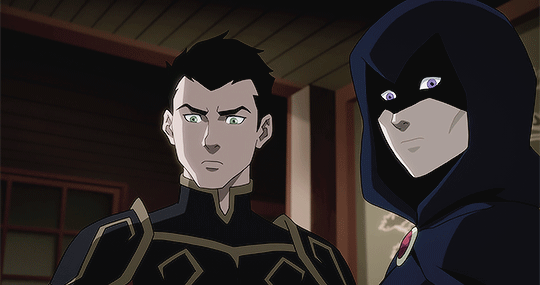
hey there sweetheart and Ramadan Mubarak <3! firstly i'm so sorry that it took me so long to respond to the ask! im ashamed it took me a year honestly. requests are closed but i still wanted to be able to write for this because we obviously need more muslim representation and also the last time i posted the muslim hc for damian there were just so many of the readers who texted me or sent asks or commented saying that they really appreciated the representation
anyways i wasn't sure if i was going to respond or not because it has been a year but since it is currently Ramadan and it's going to end very soon I figured why not
Thank you for being so respectful in your ask, I really appreciate it and I hope you like it. Hope you have a very blessed Ramadan and wishing everyone a lot of health and happiness during this time. Even to my non-muslim readers, I hope you all are doing well and you're all healthy <3333
also i know that there is a very slim chance of this happening because all of you are amazing but i will not tolerate any hate of any kind. if you
your first Ramadan after being married to Damian was certainly a new experience
before being married, you were just used to your parents handling everything for you
by the time you wake up for suhoor, the table would be set
by the time you'd be home from university, your mother would be waiting by the door with a date and a glass of water
so now that you were married and you had to handle everything on your own, it took a little bit of getting used to
luckily for you, Damian is a very hands on type of man
he's the kind of person who'd just drink a cup of water or a glass of milk, maybe a couple of dates or a fruit and he'd be ok for the remainder of the day
but god forbid you even think of doing the same thing
he'd just about have a heart attack
absolutely not
initially, he'd request Alfred to make meals for you so he could bring them home for the both of you to have suhoor together
just until the both of you got the hang of it
after that damian would either help you cook before patrol so there would be food ready for the both of you
or he'd swing by some restaurant that was open and grab some takeout for the both of you
he'd heat up the food and set the table and making sure everything was absolutely ready before finally waking you up
practically carrying your sleepyass to the table and handfeeding you so he can make sure you're eating properly
since he handles suhoor, you handle iftar and keep the table set so you can eat together
you could always just stay at the manor so you wouldn't have to worry about the meals, like bruce or dick have suggested so many times
but you prefer living alone with your husband
no offense to them at all
but it's just easier for you to maintain your modesty at your own home
anyways
your marriage gets really tested during Ramadan
the two of you are barely getting any sleep and it's difficult for you both to get used to
the only time that you both spend together and are completely present is when he should be patrolling
the lack of sleep makes you both kind of cranky
and it's difficult to not snap at each other
eventually you both get pretty tired and exhausted and just slip into routine
but of course it's nothing some sleep and some time spent together can't solve
and since you've been trying to reduce watching movies and listening to music during the holy month, you end up playing board games together or going for long drives together where you just talk and talk and talk
you thought you were extremely secure in your marriage
that was until you saw damian pout and give you the silent treatment after losing a game of gin rummy
then claiming you shouldn't be playing a game called 'jinn' in the first place
not swearing or talking shit during ramadan was especially hard for him
especially with tim and steph yelling 'fi ramadan?' at him everytime he makes even the slightest snide comment
you find it hilarious but i digress
whenever you go to the masjid for nightly prayers, damian and you will go and find a new ice cream place to try out late at night
you mention in passing how the women's side of the mosque is so bland compared to the men's and damian immediately looks into getting the mosque refurbished so that you and other women can enjoy it
damian's shoes get stolen once and the great detective actually couldn't find out who it was
you hear him complain about it constantly
CONSTANTLY
this time is when you both really lean into the adorable muslim couple aesthetic
matching prayer mats with each of your names embroidered on it
matching tasbih
and other things you get the picture
you both go all out for ramadan and decorate your home from top to bottom
since you both don't really celebrate many of the western holidays, he really wants to make this a memorable time for the both of you
and so do you
you hold an iftar party at your place many times with all your friends and family
it started out with you just inviting everyone but eventually it became a weekly potluck, which you really appreciated
bro damian is more excited about Eid than you are
he literally has to keep reminding you to get your dress ready for Eid al fitr
because he wants to get a jubbah in a matching color and surprise you
you know how you have those cute texts of girlies asking their bfs for their opinions on their nails?
the exact same thing
except with HENNA
you send him like 100 different pictures a week, planning which design you want to wear for Eid
he responds to all of them with utmost seriousness
obviously, he's an artist
he knows whats the difference between arabic and indian designs for henna
but secretly he's wondering why you're sending him so many when you only have 2 hands
but um hello he's never going to tell you that
because it's ramadan and obv ramadan related stuff is going to be appearing on everyones fyp he has to deal with both you and dick sending him videos of the scholars being funny (iykyk)
hey guys let's start ramadan w a bang
also has to deal with jason asking him CONSTANTLY how he's still able to walk around when all the demons are supposed to be locked up for the month
plus he has to now deal with you watching mukbangs and restaurant reviews and crying to him about how you're starving
why on earth did silent asmr mukbangs of wingstop get so popular only during ramadan?
believe me every single prayer damian makes during this month, he is thanking god for bringing you to him and praying for your health and your happiness
when you found out, you cried in his arms for a good solid 5 minutes
he also secretly kind of prayed for kids on laylat ul qadr but you didn't hear it from me
not only is this month really special for the both of you, you take it as an opportunity to give back
damian has wayne enterprises run soup kitchens for the entire month and they serve all people meals as well as suhoor and iftar
you both volunteer there personally
you donate money of course and damian will tell you that everytime he does it, he feels fulfilled in a way he never has before
you honestly feel so proud of the man you feel blessed to call your husband
also, like the perfect husband he is, he sends gifts and food to your parents
who quickly begin to regard him as better than your own siblings
much to his secret pleasure
uk i wish i could keep going
honestly ramadan is such a magical and rewarding time of the year
and you are so happy to spend it along with damian
P.S.
while damian completely understood the point of sacrificing a goat for Eid al adha
he still cried about it to you the night before out of guilt
you definitely donated the meat that came out of that
Forever Taglist:
@simonsbluee
@notslaybabes
@superheroesaremyjam113263
@writers-whirlwind
DC Taglist:
@emmacata
@p--e--a--c--h--e--s
@sometimeseverythingsucks
@sokkas-honour
@unstable1902
@lostgirlheart
@missdisapear
@tadpole-san
@isawachickeninatree
@uxavity
@battlenix
@capricorn-stark
@evermoore580
@dumbbitchgalore
@fuckingjinkies
@some-lovely-day
#damian wayne#damian wayne one shot#damian wayne imagines#damian wayne x y/n#damian wayne x you#damian wayne imagine#damian wayne x reader#damian wayne headcanon#damian wayne fic#batfam#batfam x you#batfam headcanons#batfamily imagine#batfamily x reader#batfam imagine#batfam x reader#damian wayne x muslim!reader#dick grayson x reader#tim drake x reader#jason todd x reader
530 notes
·
View notes
Text
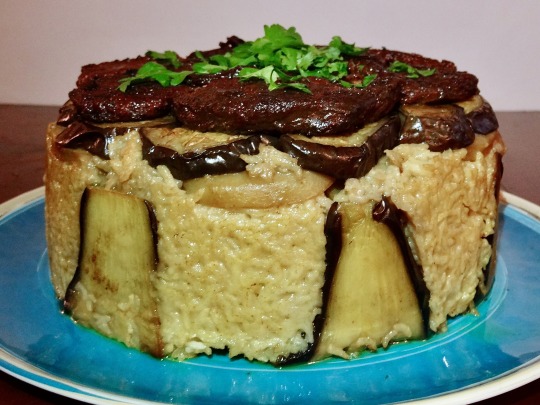
[ID: A wide cylindrical pile of rice, eggplants, and 'lamb' on a serving platter, garnished with parsley. End ID]
مقلوبة / Maqluba
مَقْلُوبَة ("maqlūba," "upside down" or "turned over") is a Levantine casserole in which spiced meat, fried vegetables, and rice are arranged in a pot and simmered; the entire pot is then inverted onto a serving tray to reveal the layered ingredients. Maqluba historically uses lamb and eggplant, but modern recipes more often call for chicken; tomato, cauliflower, potato, bell pepper, and peas are other relatively recent additions to the repertoire.
A well-made maqluba should be aromatic and highly spiced; the meat and vegetables should be very tender; and the rice should be cohesive without being mushy. A side of yoghurt gives a tangy, creamy lift that cuts through and complements the spice and fat in the dish.
Maqluba emphasizes communal eating and presentation. It is usually eaten during gatherings and special occasions, especially during Ramadan—a month of sunrise-to-sunset fasting which celebrates the revelation of the Qu'ran to the prophet Mohammad. The pot is sometimes flipped over at the table for a dramatic reveal.
History
Many sources cite Muhammad bin Hasan al-Baghdadi's 1226 Kitāb al-ṭabīkh (كتاب الطبيخ لمحمد بن حسن البغدادي) as containing the first known reference to maqluba. However, the recipes for "maqluba" in this book are actually for small, pan-fried patties of spiced ground meat. [1] The dish is presumably titled "maqluba" because, once one side is fried, the cook is instructed to turn the patties over ("أقلب الوجه الآخر") to brown the other; the identical name to the modern dish is thus coincidental.
References to dishes more like modern maqluba occur elsewhere. A type of مغمومة ("maghmūma," "covered" dish), consisting of layers of meat, eggplant, and rice, covered with flatbread, cooked and then inverted onto a serving plate, is described in a 9th-century poem by إبراهيم بن المهدي (Ibrāhīm ibn al-Mahdī):
A layer of meat underneath of which lies a layer of its own fat, and another of sweet onion, another of rice, Another of peeled eggplant slices, each looking like a good dirham honestly earned. [...] Thus layered the pot is brought to a boil first then enclosed with a disc of oven bread. On the glowing fire it is then put, thus giving it what it needs of heat and fat. When fully cooked and its fat is well up, turn it over onto a platter, big and wide. (trans. Nawal Nasrallah) [2]
These sources are both Iraqi, but one story holds that maqluba originated in Jerusalem. صلاح الدين الأيوبي (Ṣalāḥ ad-Dīn al-Ayyūbi; "Saladin"), after capturing the city from the Crusaders and reinstating Muslim rule in 1187, was served the dish, and was the first to describe it with its current name. Before this point, the Jerusalem specialty had supposedly been known as "باذنجانية" ("bāḏinjānīyya"), from "باذنجان" "bāḏinjān" "eggplant" + ية- "-iyya," a noun-forming suffix.
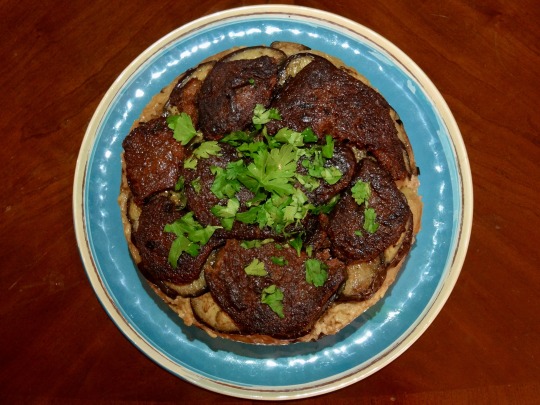
[ID: The same dish shown from directly above. End ID]
In Palestine
Maqluba is often invoked in the context of Palestinian strength and resistance, in defiance of its occasional description as an "Israeli" dish. Palestinian magazine writer Aleeya Rizvi reflects:
In the wake of the recent [2023] war in Gaza, our culinary endeavors, particularly in crafting and sharing traditional Palestinian dishes like Maqluba, represent a conscious effort to contribute to the preservation and resilience of Palestinian culture. In a time when cultural heritage is under threat, preparing and enjoying these time-honored recipes becomes more than a mere culinary activity; it transforms into a deliberate act of cultural continuity and solidarity.
Maqluba also has a more specific association with physical resistance against the backdrop of increased settler and police violence against Palestinians, including regular Israeli raids and attacks on the جامع الأقصى ("Jāmi' al-Aqṣā"; al-Aqsa mosque), during Ramadan.
The holiest month in the Islamic calendar, Ramadan is given over to fasting, prayer, and reflection; people gather together in homes and mosques to break their fast after sunset, and spend entire nights in mosques in worship. Khadija Khwais and Hanady Al-Halawani used to serve maqluba for افطار ("ifṭār," fast-breaking meal) in the Al-Aqsa mosque, until Israeli occupation authorities banned them from the mosque for "incitement."
In response, starting in 2015, Al-Halawani and other volunteer مرابطين ("murābiṭīn," lit. "holy people," guardians of the mosque) stationed themselves on the ground outside the mosque's gate (باب السلسلة; Bāb as-Silsila, "chain gate") to prepare and serve maqluba. Those who were banned from entering the mosque broke their fast and prayed at the mosque's gates, and in the nearby alleys of the Old City. The same year saw Israeli security personnel and settlers attack Palestinian protestors and guardians outside and inside the mosque with tear gas and stun grenades.
For Al-Halawani, the serving of maqluba at the al-Aqsa gates symbolizes "defiance, steadfastness, and insistence on continuing the fast [...] in spite of the occupation’s practices." The "Maqluba at al-Aqsa" ritual "has become one of the most disturbing Palestinian scenes for the occupation forces," who associate it with the defense of "Palestinian heritage" and the intent to "motivate worshipers and murabitin to repel incursions into the mosque." (Al-Halawani has been arrested, threatened, beaten, and detained by Israeli police multiple times for her role as a defender of Al-Aqsa. She was among the prisoners freed in trades between Israel and Hamas in December 2023.)
In 2017, occupation forces installed metal detectors, electronic gates, metal barriers, and police cameras to surveil worshipers following a shoot-out at one of al Aqsa's gates. Hundreds of protesters refused to enter the mosque until the repressive measures were removed, instead gathering and praying in its courtyard; surrounding families bolstered the sit-ins by serving food and drink. When the gates were dismantled, over 50,000 people gathered to eat maqluba in celebration, picking up on the earlier association of the dish with Saladin's victory (and its resultant alternate name, "أكلة النصر," "ʔakla an-naṣr," "victory meal").
The name "maqluba," meaning "upside-down" or "inverted," may be associated with victory and resistance as well. Fatema Khader noted in 2023 that the method of serving maqluba was a "symbolic representation of how Israeli policies and decisions against Palestinians will be flipped on their heads and become rendered meaningless." It is also relevant that maqluba is meant to be served to large groups of people, and can thus be linked, symbolically and literally, to solidarity and communal resistance.
This year in Gaza, Palestinians show steadfast optimism as they paint murals, hang lanterns, buy sweets, hold parties, and pray in groups amongst the rubble where mosques once stood. But despite these efforts at creating joy, the dire circumstances take heavy tolls, and the holiday cannot be celebrated as usual: Israel's campaign of slow starvation led Ghazzawi Diab al-Zaza to comment, "We have been fasting almost against our will for three months".
Donate to provide hot meals in Gaza for Ramadan
[1] Also reprinted in Mosul: Umm Al-Rubi'in Press (مطبعة ام الربيعين) (1934), p. 57. For an English translation see Charles Perry, A Baghdad Cookery Book (2005), pp. 77-8.
[2] This poem, as well as one of Ibn al-Mahdi's maghmuma dishes, were compiled in Ibn Sayyar al-Warraq's 10th-century Book of Dishes (كتاب الطبيخ وإصلاح الأغذية المأكولات وطيّبات الأطعمة المصنو; "Kitāb al-ṭabīkh waʔiṣlāḥ al-ʔaghdiyat al-maʔkūlāt waṭayyibāt ʔaṭ'ima al-maṣno," "Book of cookery, food reform, delicacies, and prepared foods"), p. 99 recto. For Nasrallah's English translation see Annals of the Caliph's Kitchens, pp. 313-4.
In the 14th-century Andalusian Cookbook (كتاب الطبيخ في المغرب والأندلس في عصر الموحدين، للمكلف المجهول; "Kitāb al-ṭabīkh fī al-Maghrib wa al-Andalus fī ʻaṣr al-Mawahḥidīn," "Book of cookery from the Maghreb and Andalusia in the era of Almohads"), a maghmuma recipe appears as "لون مغموم لابن المهدى", "maghmum by Ibn al-Mahdi". For an English translation see An Anonymous Andalusian Cookbook, trans. Perry et al.
Ingredients:
For a 6-qt stockpot. Serves 12.
For the meat:
1 recipe seitan lamb
or
2 cups (330g) ground beef substitute
1 cinnamon stick
1 bay laurel leaf
Pinch ground cardamom
Several cracks black pepper
For the dish:
3 cups (600g) Egyptian rice
2 medium-sized globe eggplants
2 large Yukon gold potatoes (optional)
Vegetarian 'chicken' or 'beef' bouillon cube (optional)
2 1/2 tsp table salt (1 1/2 tsp, if using bouillon)
Vegetable oil, to deep-fry
Fried pine nuts or sliced blanched almonds, to top
Egyptian rice is the traditional choice in this dish, but many modern recipes use basmati.
I kept my ingredients list fairly simple, but you can also consider adding cauliflower, carrots, peas, chickpeas, zucchini, bell pepper, and/or tomato to preference (especially if omitting meat substitutes).
For the spices:
1 1/2 Tbsp maqluba spices
or
1 4" piece (3g) cinnamon bark, toasted and ground (1 1/2 tsp ground cinnamon)
3/4 tsp (2.2g) ground turmeric
3/4 tsp (1.5g) cloves, toasted and ground
3/4 tsp (2.2g) black peppercorns, toasted and ground
15 green cardamom pods (4.5g), toasted, seeds removed, and ground (or 3/4 tsp ground cardamom)
Instructions:
For the meat:
1. Prepare the seitan lamb, if using: it will need to be started several hours early, or the night before.
2. If using ground meat: heat 2 tsp oil in a skillet on medium. Add cinnamon stick and bay leaf and fry for 30 seconds until fragrant.
3. Add meat and ground spices and fry, agitating occasionally, until browned. Set aside.
For the dish:
2. Rinse rice 2 to 3 times, until water runs almost clear. Soak in cold water for 30 minutes, while you prepare the vegetables.
3. Optional: to achieve a presentation with eggplant on the sides of the maqluba, remove the skin from either side of one eggplant (so that all slices have flesh exposed on both sides) and then cut lengthwise into 1/2" (1cm)-thick slices.
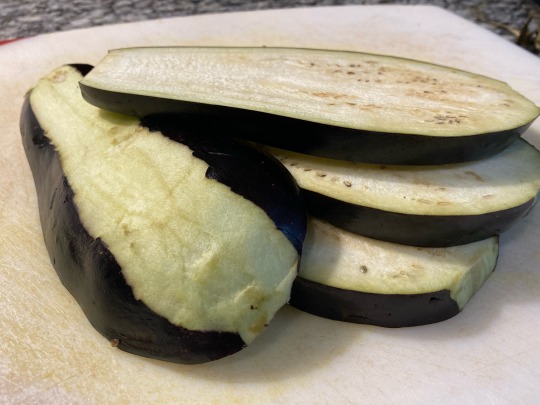
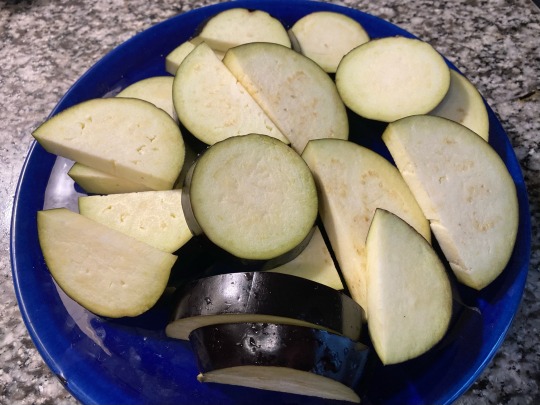
Cut the other eggplant (or both eggplants) widthwise into coins and half-coins.
4. Sprinkle eggplant slices with salt on both sides and leave for 10-15 minutes to release water.
5. Peel potatoes and cut in 1/4" (1/2 cm) slices.
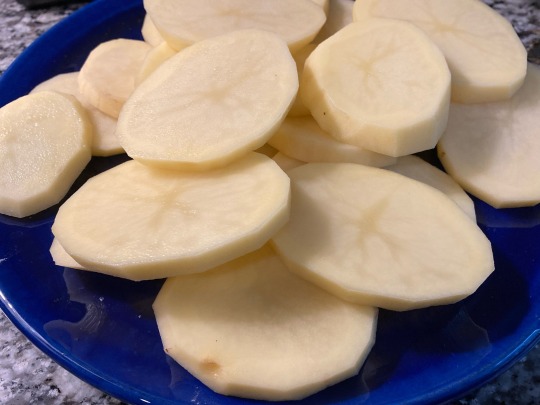
6. Heat about an inch of oil in a deep skillet or wok on medium (a potato slice dropped in should immediately form bubbles). Fry the potato slices until golden brown, then remove onto a paper-towel-lined plate or wire cooling rack.
7. Press eggplant slices on both sides with a towel to remove moisture. Fry in the same oil until translucent and golden brown, then remove as before.
Fry other vegetables (except for tomato, chickpeas, and peas) the same way, if using.
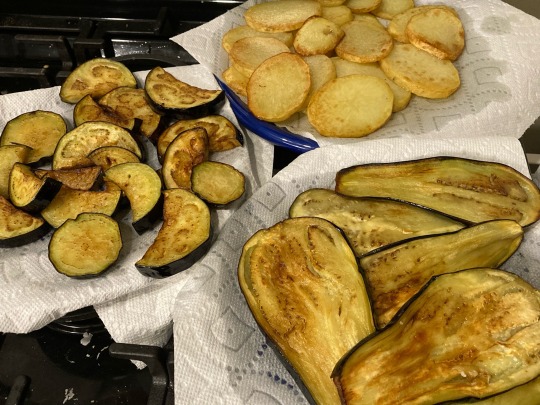
8. Drain rice. Whisk bouillon, salt, and ground spices into several cups of hot water.
9. Prepare a large, thick-bottomed pot with a circle of oiled parchment paper (or with a layer of sliced tomatoes). Add ground meat, if using. Layer widthwise-sliced eggplants into the pot, followed by potatoes. Place longitudinally sliced eggplants around the sides of the pot, large side up.
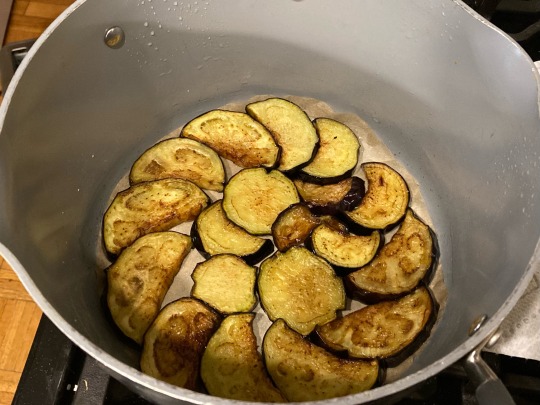
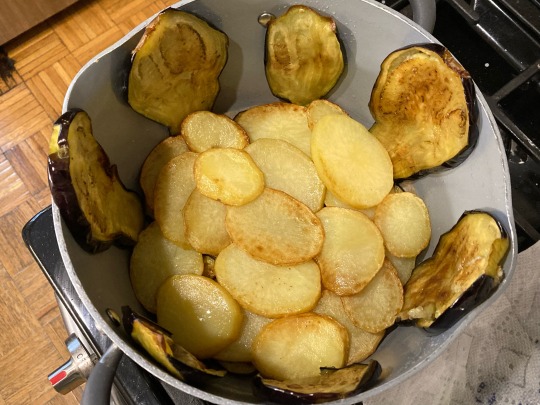
10. Add rice and pack in. Fold eggplant slices down over the rice, if they protrude.
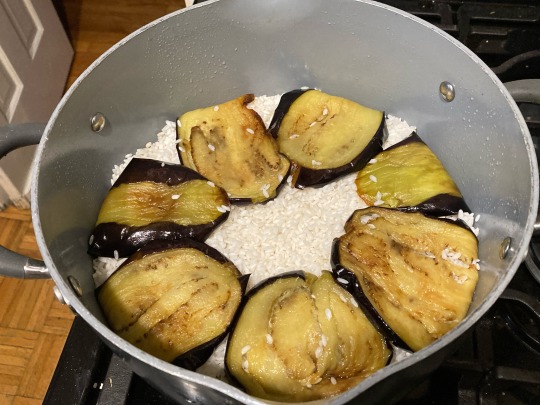
11. Pour broth into the pot, being careful not to upset the rice. Add more water if necessary, so that the rice is covered by about an inch.
12. Heat on medium to bring to a boil. Reduce heat to low, cover with a closely fitting lid, and cook 30 minutes.
13. If rice is not fully cooked after 30 minutes, lightly stir and add another cup of water. Re-cover and cook another 15 minutes. Check again and repeat as necessary.
14. Allow maqluba to rest for half an hour before flipping for best results. Place a large platter upside-down over the mouth of the pot, then flip both over in one smooth motion. Tap the bottom of the pot to release, and leave for a few minutes to allow the maqluba to drop.
15. Slowly lift the pot straight up, rotating slightly if the sides seem stuck.
16. Top with fried seitan lamb, chopped parsley, and fried pine nuts or almonds, as desired.
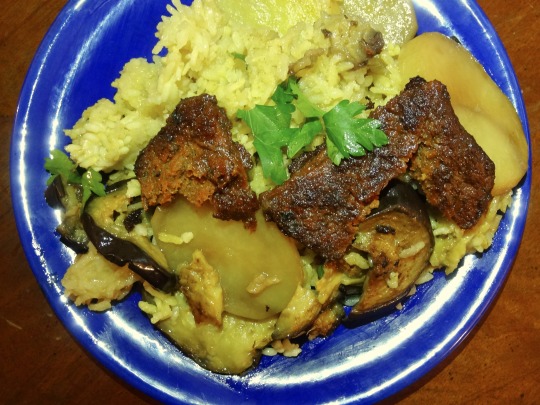
369 notes
·
View notes
Text
dhul hijjah - a second chance after ramadan ♡
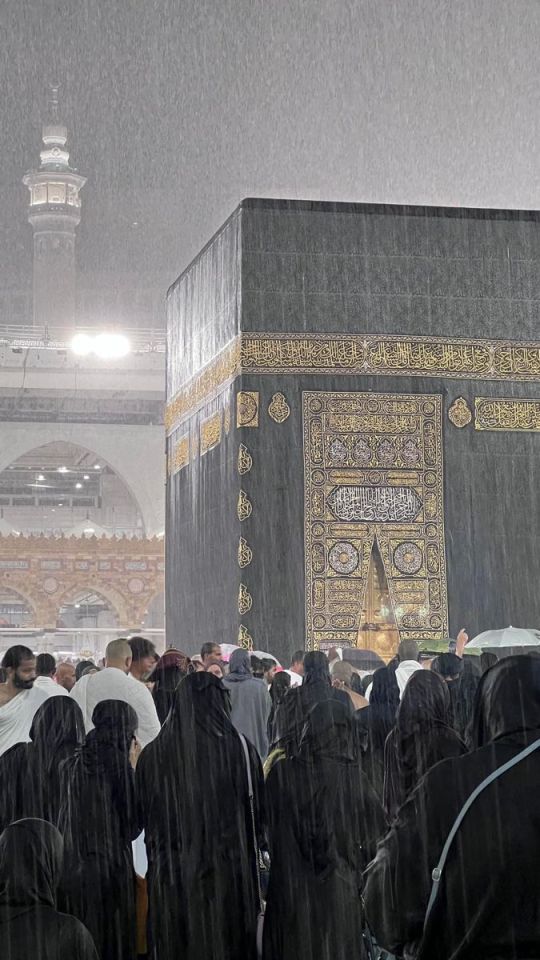
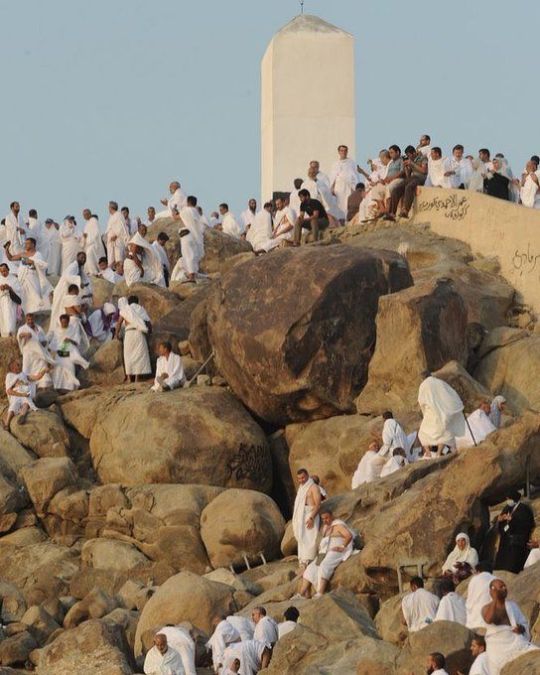
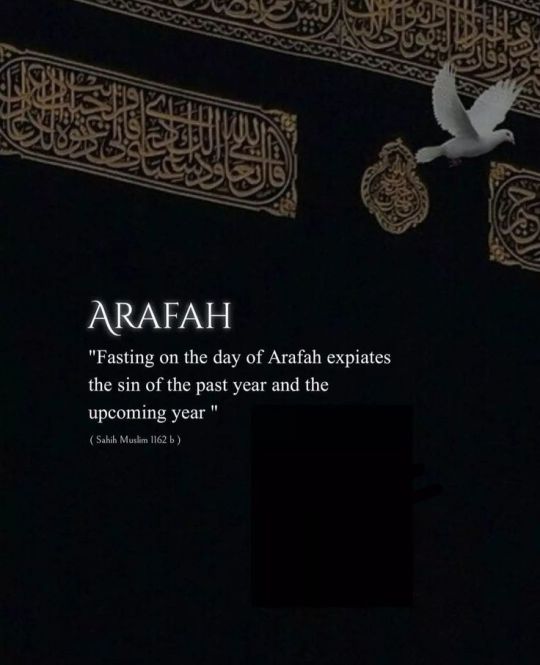
what is dhul hijjah?
meaning 'the month of the pilgrimage' as many muslims go on hajj in this time, dhul hijjah is the twelfth and final month of the islamic year. the first ten days of this month are the best days of the entire year. yes - even better than ramadan:
it was narrated by Ibn Abbas that the Prophet ﷺ said: “There are no days during which righteous deeds are more beloved to Allah than these days,” meaning the (first) ten days of Dhul- Hijjah" - Sunan Ibn Majah 1727
these ten days encompass the day of Arafah, Hajj, and Eid ul-Adha
this month, we remember prophet Ibrahim (as) and how he was told by Allah to sacrifice his son, Hadrat Ismail (as). he took hadrat Ismail (as) on top of mount Arafat for the sacrifice, and just as he was about to sacrifice Ismail (as), Allah told him to stop as He was only testing him to see if he was truly obedient and willing to sacrifice everything for Allah's sake. the 9th day of dhul hijjah is the day of Arafah, commemorating this event.
we also remember how Allah told Ibrahim (as) to leave Ismail (as) and his wife, Hadrat Hajar, in a desert - which, today, is present day makkah.
this month is therefore about obedience, surrender and sacrifice for Allah سُبْحَٰنَهُۥ وَتَعَٰلَ��ٰ.
depending on the sighting of the moon, dhul hijjah is expected to begin friday 7th june!
what to do in these first ten days?
even if you're not going for hajj, you should use these blessed days for extra righteous deeds and worship, especially on the day of arafah - the 9th day (which falls on 16th june this year, Insha'Allah) - the day before eid.
FASTING
it is a sunnah to fast the first 9 days of dhul hijjah. if you won't fast all 9 days, then it's best to prioritise the 9th day, the day of Arafah. this is because the prophet ﷺ said: “Fasting on the Day of ‘Arafah expiates for the sins of the year before and the year after.” (Sunan Ibn Majah 1730) however, unless you're going for hajj and you're actually at Afarah, then you cannot as it's forbidden to fast while on the mountain.
DHIKR
it's extremely important to increase your dhikr in this time. recite the tasbeeh, tahmeed, takbeer and tahleel often: tasbeeh - subhanallah (Holy is Allah) tahmeed - alhamdulillah (all praise belongs to Allah) takbeer - Allah Akbar (Allah is the Greatest) tahleel - laa ilaha ill-Allah (there is no God except Allah) Allah said “remembrance of Allah indeed is the greatest virtue” (29:46) - it brings you closer to Him, you feel more certain in His powers that He can remove any hardship which makes the heart feel less anxious, Allah becomes your Friend, you'll become successful (remember Allah often so you may prosper” (8:46), it cleans your heart, it protects you from harm, Allah becomes pleased with you. it truly is the greatest virtue.
also recite istighfar (astagfirullah) and repent for your sins
the best dua to recite on the day of Arafah itself is:
laa ilaaha ill-allaahu, waḥdahu laa shareeka lah, lahul-mulku wa lahul-ḥamdu, wa huwa ‛alaa kulli shay’in qadeer - (None has the right to be worshipped except Allah, alone, without partner. To Him belongs sovereignty and all praise and He is over all things omnipotent)
OTHER INCREASED ACTS OF WORSHIP
do extra voluntary acts of worship (nawafil, sunnah prayers, duha prayers)
read a lot of Qur'an
listen to the Qur'an more
send many, many salutations to the Prophet ﷺ (durood sharif!)
practice gratitude. what are you thankful for?
pray tahajjud
give sadaqah / donate to a charity. make sacrifices!
be kind!
read translation and commentary of surahs
listen to islamic podcasts/read islamic books to increase your knowledge
memorise a surah
talk to Allah!!!! pray!!!!
try and increase your acts of worship throughout the 9 days and especially on the 9th day, the day of arafah, which is the day before eid! (16th june Insha'Allah, depending on where you are in the world)
10th day - eid ul adha
on the tenth day of dhul hijjah (eid), our beloved Prophet ﷺ used to give Qurbani (a sacrifice) every year to remember Ibrahim (as) almost sacrificing his son for Allah سُبْحَٰنَهُۥ وَتَعَٰلَىٰ's sake. muslims sacrifice animals all over the world to follow this sunnah, and donating qurbani is encouraged for every Muslim who is financially able to do so (this can be done online)

may Allah سُبْحَٰنَهُۥ وَتَعَٰلَىٰ make it easy for us to utilise these blessed and best 10 days to the best of our abilities, forgive us of our sins, draw us ever nearer to Him and allow us to become His best friends, Allahumma Ameen ♡
#islam#dhul hijjah#arafah#muslim#religion#sabrgirl#ramadan#allah#quran#prayers#islamic#muslims#arafat#jummah
180 notes
·
View notes
Text
Abu al-Faraj al-Isfahani’s Kitab al-Aghani records the lives of a number of individuals including one named Tuways who lived during the last years of Muhammad and the reigns of the early Muslim dynasties. Tuways was mukhannathun: those who were born as men, but who presented as female. They are described by al-Isfahani as wearing bangles, decorating their hands with henna, and wearing feminine clothing. One mukhannathun, Hit, was even in the household of the Prophet Muhammad. Tuways earned a reputation as a musician, performing for clients and even for Muslim rulers. When Yahya ibn al-Hakam was appointed as governor, Tuways joined in the celebration wearing ostentatious garb and cosmetics. When asked by the governor if he were Muslim Tuways affirmed his belief, proclaiming the declaration of faith and saying that he observes the fast of Ramadan and the five daily prayers. In other words, al-Isfahani, who recorded the life of a number of mukhannathun like Tuways, saw no contradiction between his gender expression and his Muslimness. From al-Isfahani we read of al-Dalal, ibn Surayj, and al-Gharid—all mukhannathun—who lived rich lives in early Muslim societies. Notably absent from al-Isfahani’s records is any state-sanctioned persecution. Instead, the mukhannathun are an accepted part of society.
...
Far from isolated cases, across Islamic history—from North Africa to South Asia—we see widespread acceptance of gender nonconforming and queer individuals. - Later in the Ottoman Empire, there were the köçek who were men who wore women’s clothing and performed at festivals. Formally trained in dance and percussion instruments, the köçek were an important part of social functions. A similar practice was found in Egypt. The khawal were male dancers who presented as female, wearing dresses, make up, and henna. Like their Ottoman counterparts, they performed at social events.
- In South Asia, the hijra were and are third-sex individuals. The term is used for intersex people as well as transgender women. Hijra are attested to among the earliest Muslim societies of South Asia where, according to Nalini Iyer, they were often guardians of the household and even held office as advisors.
- In Iraq, the mustarjil are born female, but present as men. In Wilfred Thesiger’s The Marsh Arabs the guide, Amara explains, “A mustarjil is born a woman. She cannot help that; but she has the heart of a man, so she lives like a man.” When asked if the mustarjil are accepted, Amara replies “Certainly. We eat with her and she may sit in the mudhif.” Amara goes on to describe how mustarjil have sex with women.
...
Historian Indira Gesink analyzed 41 medical and juristic sources between the 8th and 18th centuries and discovered that the discourse of a “binary sex” was an anachronistic projection backwards. Gesink points out in one of the earliest lexicography by the 8th century al-Khalil ibn Ahmad that he suggests addressing a male-presenting intersex person as ya khunathu and a female-presenting intersex person as ya khanathi while addressing an effeminate man as ya khunathatu. This suggests a clear recognition of a spectrum of sex and gender expression and a desire to address someone respectfully based on how they presented.
Tolerance of gender ambiguity and non-conformity in Islamic cultures went hand-in-hand with broader acceptance of homoeroticism. Texts like Ali ibn Nasir al-Katib’s Jawami al-Ladhdha, Abu al-Faraj al-Isfahani’s Kitab al-Aghani, and the Tunisian, Ahmad al-Tifashi’s Nuz’ha al-‘Albab attest to the widespread acceptance of same-sex desire as natural. Homoeroticism is a common element in much of Persian and Arabic poetry where youthful males are often the object of desire. From Abu Nuwas to Rumi, from ibn Ammar to Amir Khusraw, some of the Islamic world’s greatest poets were composing verses for their male lovers. Queer love was openly vaunted by poets. One, Ibn Nasr, immortalizes the love between two Arab lesbians Hind al Nu’man and al-Zarqa by writing:
“Oh Hind, you are truer to your word than men. Oh, the differences between your loyalty and theirs.”
...
Acceptance of same-sex desire and gender non-conformity was the hallmark of Islamic societies to such a degree that European travelers consistently remarked derisively on it. In the 19th century, Edward Lane wrote of the khawal: “They are Muslims and natives of Egypt. As they personate women, their dances are exactly of the same description as those of the ghawazee; and are, in like manner, accompanied by the sound of castanets.”
A similarly scandalized CS Sonnini writes of Muslim homoerotic culture:
“The inconceivable appetite which dishonored the Greeks and the Persians of antiquity, constitute the delight, or to use a juster term, the infamy of the Egyptians. It is not for women that their ditties are composed: it is not on them that tender caresses are lavished; far different objects inflame them.”
In his travels in the 19th century, James Silk Buckingham encounters an Afghan dervish shedding tears for parting with his male lover. The dervish, Ismael, is astonished to find how rare same-sex love was in Europe. Buckingham reports the deep love between Ismael and his lover quoting, “though they were still two bodies, they became one soul.”
...
Today, vocal Muslim critics of LGBTQ+ rights often accuse gay and queer people of imposing a “Western” concept or forcing Islam to adjust to “Western values” failing to grasp the irony of the claim: the shift in the 19th and 20th century was precisely an alignment with colonial values over older Islamic ones, all of which led to legal criminalization. In fact, the common feature among nations with anti-LGBTQ+ legislation isn’t Islam, but rather colonial law.
Don't talk to me I'm weeping. I'm not Muslim, but the grief of colonization runs in the blood of every Global South person. Dicovering these is like finding our lost treasures among plundered ruins.
Queer folk have always, always been here; we have always been inextricable, shining golden threads in the tapestry of human history. To erase and condemn us is to continue using the scalpel of colonizers in the mutilation and betrayal of our own heritage.
#islam#queer muslims#queer history#lgbt history#colonization#colonialism#imperialism#world history#trans positivity#gay positivity#intersex positivity#queer poetry#queer love#queer art#islamic culture#lgbtqia#islamic history#global south#pinkwashing#islamphobia#colonial violence#queer erasure#arab culture#ottoman empire#hijra#wlw#mlm#knee of huss#same sex love#egyptian culture
800 notes
·
View notes
Text
🧵 A brief international law thread on PM Netanyahu's announcement that "as of this morning, the entry of all goods and supplies to the Gaza Strip will be halted."
In summary, Israel's actions in halting aid are entirely just and legitimate under international law.
Israel is not obliged to provide aid to an enemy in time of war, especially when it has been shown to be used for military purposes.
Under customary international law, Israel's obligations are limited to not unreasonably hampering or preventing the entry of aid by third parties ... unless there are valid reasons for doing so.
In the present circumstances, Article 23 of the 4th Geneva Convention is the only applicable provision that governs Israel’s obligation to allow free passage of humanitarian supplies.
However, Art. 23 is extremely limited in both scope and application and only obliges Israel to allow the free passage of supplies to a limited category of persons, including medical supplies necessary for the purposes of religious worship or food for children under the age of 15. HOWEVER, this is provided there are no serious reasons to believe these supplies are being diverted diverted from their destination or used for military purposes.
Both the U.S. Defense Department Law of War Manual and the UK Joint Service Manual of the Law of Armed Conflict reiterate and mirror Art. 23 of 4th GA.
In this regard, there has been ample evidence that since the beginning of the Oct 7th war initiated by Hamas, and including following the commencement of Phase 1 of the hostage - ceasefire deal, Hamas has continued to both syphon / divert aid, and usurp it for military purposes and to maintain the ongoing captivity of hostages.
Notwithstanding Israel is at war in Gaza, it is not occupying Gaza, so we can dismiss this claim altogether and the responsibilities that entails, not least given Hamas still remains the de-facto rulers of Gaza.
Israel is also entirely permitted to halt the supply of aid into Gaza, provided that doing so is not intended to starve the local civilian population (see Geneva Conventions, U.S. Defense Department Law of War Manual, UK Joint Service Manual of the Law of Armed Conflict, The Hague Convention IV, plus Customary Int'l Law). In this regard, it is important to underscore that there is no starvation in Gaza. Since commencement of Phase 1 of the hostage - ceasefire deal on Jan 19th, over 25,000 trucks have entered Gaza (about 600 per day), carrying a total of 57,000 tons of food. This is a similar level to prewar aid deliveries. Meantime, water continues to be provided through Israeli pipelines as well. It is estimated, that based on current provisions, there is at least 4 months adequate supply of aid in Gaza.
Also, do not forget that Gaza shares a border with Egypt. Why is more pressure not being placed on Egypt to open its borders to allow the facilitation of further aid?
In summary, Israel's actions in halting aid are entirely just and legitimate under international law.
Those who seek a resumption of further aid into Gaza, would be well advised to direct their outrage and pressure on Hamas (and their sponsor Qatar) to accept the Witkoff framework for the continuation of a temporary ceasefire during the Ramadan and Passover period, and to demand the immediate and unequivocal release of all the remaining hostages being held captive in Gaza.


45 notes
·
View notes
Text

When President Biden called the emir of Qatar and the president of Egypt on Thursday, his message was direct: Get me a deal, two U.S. officials tell Axios.
Why it matters: Biden, under increasing pressure from progressive Democrats, desperately wants a temporary ceasefire in Gaza. He sees a deal for the hostages held by Hamas as the only way to get it while maintaining his unwavering support for Israel.
Biden wants the Qataris and the Egyptians — the key mediators in the hostage talks — to get the terror group to agree to a deal before the Muslim holy month of Ramadan, which starts March 10.
Driving the news: As part of the framework presented by the U.S., Egypt and Qatar in Paris on Feb. 23, Israel would release about 400 Palestinian prisoners — including 15 convicted of murdering Israelis.
In exchange, Hamas would free about 40 Israeli hostages, including women, female soldiers, men over 50 and men who are in serious medical conditions.
The framework also included a roughly six-week pause in the fighting in Gaza — one day for every living hostage released — as well as a readiness for an initial and gradual return of Palestinian citizens to the northern part of the Strip.
U.S. and Israeli officials say Hamas' response to the proposed deal didn't include a list of hostages who are alive, or how many Palestinian prisoners the group is demanding in return.
Hamas is believed to still be holding 134 people it took hostage during the attack on Israel that began Oct. 7; 32 of the hostages have been confirmed dead.
Behind the scenes: In his call with the Qatari Emir Sheikh Tamim bin Hamad Al Thani and Egyptian President Abdel Fattah el-Sisi, Biden told them how the U.S. is pressing Israel to agree to the deal, and urged them to push Hamas to do the same, two sources with direct knowledge of the calls said.
"All three leaders agreed the onus is currently on Hamas to close remaining gaps in the package," another U.S. source with direct knowledge of the calls said.
"The Egyptian and Qatari leaders described their efforts with Hamas and shared the sense of urgency to get this done."
Mossad director David Barnea, who is leading Israel's negotiations team, speaks each day with CIA director Bill Burns about the hostage talks, a senior Israeli official said.
The official put the chances of a deal at 50-50. "Biden's personal involvement and his calls with the leaders of Qatar and Egypt are very important," the official said.
The big picture: The deaths of dozens of Palestinians on Thursday amid chaos surrounding an aid convoy in Gaza increased Biden's urgency in seeking a hostage deal that would lead to a ceasefire, a U.S. official said.
The U.S. began air drops of aid to Gaza on Saturday, which will continue, but aren't a game changer in addressing the humanitarian crisis there, U.S. officials acknowledge.
Two U.S. officials said only a hostage deal and a ceasefire could dramatically improve the situation in Gaza by allowing significantly more food and medical supplies to reach people in need — and lower criminal gangs' incentive to loot the aid.
State of play: A Hamas delegation is in Cairo to meet with Egyptian intelligence officials, according to press reports there. Representatives of the CIA are also there to follow the talks.
There have been two main sticking points in the negotiations: the number of Palestinian prisoners to be released for every hostage released, and how many Palestinian civilians would be allowed to return to their homes in northern Gaza.
"The Israelis accepted the terms of the deal and if Hamas agrees, a six-week ceasefire can start immediately," a senior U.S. official said.
"We still hope we can get a deal by Ramadan. The ball is in Hamas' court."
What's next: Israeli minister Benny Gantz, a member of Israel's war cabinet, will arrive in Washington on Sunday. Gantz is pushing hard for a deal and has said the release of hostages is more important and urgent than destroying Hamas, which is Prime Minister Benjamin Netanyahu's goal.
Netanyahu didn't want Gantz to visit the U.S. and told him in a call on Friday that "there is only one prime minister in Israel," Netayahu's aides said.
Gantz will visit the White House on Monday and have separate meetings with Vice President Kamala Harris and National Security Adviser Jake Sullivan, a Biden administration official said.
Qatar's prime minister, Mohammed Bin Abdulrahman al-Thani — a key player in the hostage-ceasefire negotiations — will visit Washington on Tuesday to discuss strategy with U.S. officials.
212 notes
·
View notes
Note
Ngl I've been thinking about this for awhile, imagine Hannibal Lecter with a Burlesque dancer like in the movie from 2010 with Cher and Christina Aguilera, reader as Ali/Christina would be really cool
A/N; Hi! Thank you for this request, i love that movie so much i sometimes listen to its songs. I had fun writing this. Happy Ramadan!
Words; 1.413K
Warnings; None.
‘’Hey! Y/N!’’ you heard a voice from the director of the show, ‘’It’s your turn now!’’ you looked at your reflection on the mirror for the last time, hair done, nails done, a nice lingerie that had rime stones on it… you were young and sexy and that was enough for your confidence. You’re good at climbing into a huge champagne glass which is filled with water and soup and big sponges and do your number. Years ago when you were a child you grew up watching burlesque dancer and the numbers they did on stage and climbing into a tall glass always entertained you, it was a classic. You were the only one who could do it right in your group, the stage was set, you had two dancers either side of the glass, dancing to the rhythm. When you walked to the stage the spot light found you and your audience started screaming for you, getting good reviews was a part of your every night. You loved the attention, slowly getting rid of your gloves you noticed someone. You knew your regular customers and this man was on the same spot, which was the VIP section, alone, drinking his champagne and admiring you from afar. He never flinched ever and you could tell that he liked dressing up and keeping everything pristine. Most of your regulars loved to send you gifts, mostly flowers, perfumes etc. However, this one never sent you anything, you started to get curious about him and asked your crew, they only knew that he was a psychiatrist and that’s it.
You moved on the stage like delicate swan, so elegant and all of the eyes were on you. As you danced to the rhythm and slowly undressed you felt his burning gaze, you knew that after the show you were going to get lots of presents except from him.
He never made a move. Most of the regular spectators loved to send you drinks and presents after the show but this particular gentleman only occupied his seat at the VIP section every week, drank his champagne, ate his luxurious dish and watched you from afar. ,
Human mind is tricky, the brain loves to focus on that one person who doesn’t have his focus on us.
Nonetheless you were intrigued by him.
Thanks to the help of the dancers on the stage you climbed into the champagne glass, your rime stoned lingerie shining under the spot light. The water was cold just how you liked it. Moving around in the glass, splashing water has always made your audience smile and left them satisfied. Maybe because of the fact that your lingerie was soaked and your damp body shimmered under the lights…
When you were done you were escorted back, it felt so cold so you wore your pink robe, people you work with congratulated you, and you kindly smiled. Before you could open your dressing room’s door and throw yourself on your pink fluffy couch your boss, an old lady with long silver hair and kind blue eyes stopped you, ‘’A gentleman is inside, he has an offer for you.’’ You were puzzled. ‘’Thank you for the heads up.’’ Before you walked in you checked your hair and make-up, and then you walked in.
He was sitting on the pink couch, when you entered and as soon as he saw you he bolted to his feat. ‘’Miss Y/L/N.’’ he addressed you and you smiled. He had a dark grey 3 piece suit which fit him perfectly, he looked odd in this room of pink. He extended his large hand and continued, ‘’It is a pleasure finally meeting you in person.’’ You held his hand and you felt a sudden rush to your stomach. Why did he have such an impact on you? You noticed the way he emphasized the word ‘’finally’’ he was also aware of you noticing him for weeks. ‘’Please.’’ You gestured him to sit back, you sat across him. The sudden realization hit you, you had your soaking wet lingerie underneath your pink robe. His face didn’t give any clues whatsoever. ‘’Allow me to introduce myself, I am Doctor Hannibal Lecter.’’ You nodded gently, legs crossed. Melodies from the stage floating into the room, in that brief silence you wondered why did your boss allow him inside? It usually never happens.
He must have persuaded the old lady with something… most likely money.
‘’Y/N Y/L/N. At your service.’’ You replied with a soldier tone to break the ice and caught him smirking a bit. His maroon eyes looked into your eyes directly, you felt shiver running down your spine, he was intense. His gaze found the pile of presents resting on the table at the corner of the room, was that annoyance written on his sharp face?
‘’May I ask the reason why you are here Doctor Lecter?’’ you attracted his gaze again, you could feel your palms getting sweaty, his presence made you nervous and you didn’t even know this person.
‘’I would love to hire your service for one of my dinner parties.’’ He bluntly said, he seemed like a guys who would go and get something, a true dominant man. Also the way he used ‘’your service’’ didn’t go unnoticed, he was respectful. His hand went inside his jacket’s pocket to pull out a check book, he wrote something and ripped the page, you were excited when he handed it to you.
When you saw the price you were shocked.
‘’But this is too much-‘’ you said with wide eyes, holding the check as if it is something fragile, ‘’Burlesque is an art and I’m never shy spending money on art.’’ He replied, you could sense the strong undertones. ‘’When is the party?’’
You accepted his offer, this was the first time you went to do a number to someone’s home. He mentioned that his home was enough to bring your essentials. For a week you practiced and practiced. You felt like you needed to make him proud, even though he paid you and this was your job you just wanted to be perfect at it and have a good time.
He didn’t lie, his home was like a castle, more than enough for your show. You were ready and also small group of your dancers were ready too, everything was set.
Dancing so close to the audience didn’t make you nervous at all, you felt alive, the music felt like it was running through your veins, you were one with it. You could feel the public’s eyes were on you in an awe of your art, the energy was immaculate. You could also see the host of the party, Doctor Lecter, holding his drink in one hand, the other in his pocket, his maroon gaze focused on you and only you. Almost predatory.
The champagne glass act made the audience sigh in excitement, it seemed like this was the first time they experience this and it feed your soul.
After the show you went upstairs to change because Doctor Lecter wanted to introduce you to his guests. You were touching on your make up when someone knocked on your door.
‘’Come in.’’
It was Lecter himself. ‘’You are a vision.’’ He said leaning on the door, you smiled. ‘’I have a gift for you.’’ He walked towards you, ‘’You didn’t have to Doctor Lecter.’’ You said when he opened the velvet box he was holding, a golden necklace was in that box, 24 karat you assumed. ‘’Please,’’ he said, ‘’Hannibal.’’
‘’Hannibal you already paid more than the actual price and this…’’ you were blushing, ‘’I’ve wanted to give you this for so long,’’ he confessed, ‘’but I was waiting for the right time.’’ You watched him place the necklace on you through the mirror, both of his hands found their place on your shoulders, he knelt and he planted a soft kiss on your cheek, he turned to the mirror to see your face and lock eyes.
‘’Looks good on you.’’ He said, you touched the necklace, ‘’Thank you, you are so generous.’’ His aura was heavy, his manly cologne filled your nostrils. You were intoxicated, it was wrong, he was your employer. ‘’I hope we will be more close from this night on.’’
You could feel your heart racing, was this a some kind of proposal? Only time would tell. Hand in hand you left the room to mingle.
#fanfiction#fanfic#reader insert#hannibal#hannibal lecter#hannibal x reader#hannibal x you#mads mikkelsen#reader#mads mikkelsen x reader#hannibal lecter fanfiction#hannibal the cannibal#hannibal x y/n#hannibal nbc#fem!reader#hannibal lecter x reader#burlesque#one shot fanfiction#requests are open#requests open#request#reqs open
134 notes
·
View notes
Text


Ramadán Mubarak! 💕 - February 28, 2025
My first Ramadan after moving out for good! Our neighbors gave some gifts and we did as well and it was fun 🥺🥺 Usually its my parents and their friends who do this kind of stuff- and its never packaged cutely lol because they're all first gen immigrants and what you give is more important than the presentation lol. But I love making things cute its a lot of fun! I was scared and worried for this Ramadan but excitement is taking over 🤲🏼
31 notes
·
View notes